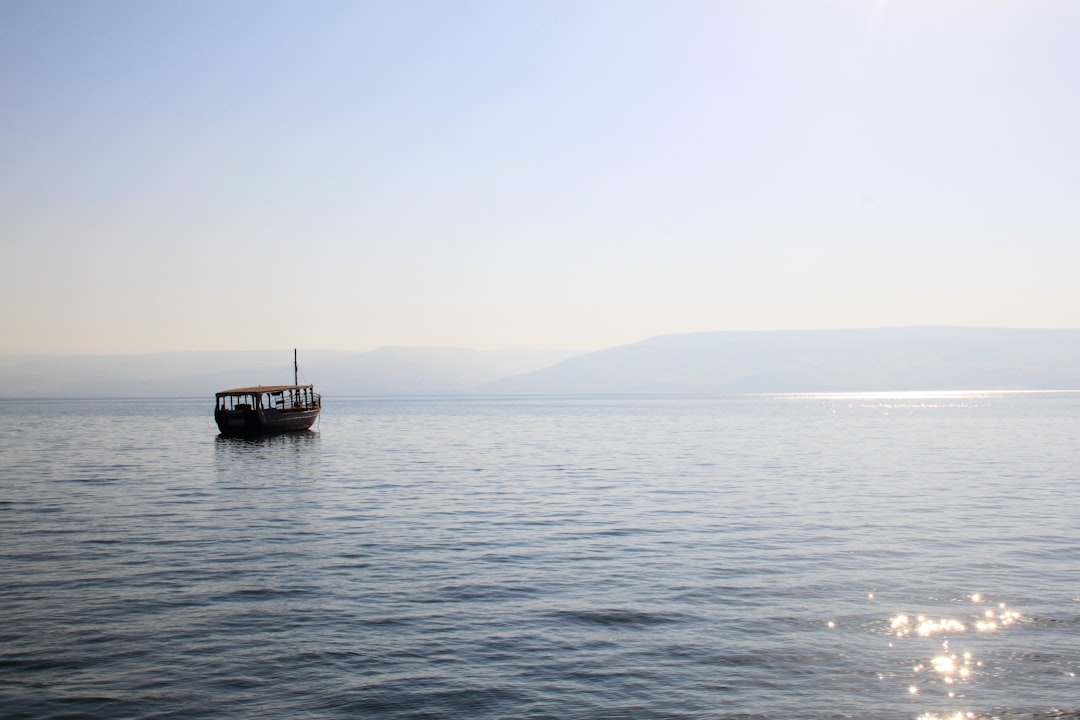The Miracles of Jesus Part 6: Miraculous Catch of Fish
Luke 5:1-11; Matthew 28:19-20 Jesus demonstrates His powers over creation and His abundance in providing. His first Disciples are now committed to follow Him and fish for men.
“Now it happened that while the crowd was pressing around Him and listening to the word of God, He was standing by the lake of Gennesaret; and He saw two boats lying at the edge of the lake; but the fishermen had gotten out of them and were washing their nets. And He got into one of the boats, which was Simon’s, and asked him to put out a little way from the land. And He sat down and began teaching the people from the boat. When He had finished speaking, He said to Simon, “Put out into the deep water and let down your nets for a catch.” Simon answered and said, “Master, we worked hard all night and caught nothing, but I will do as You say and let down the nets.” When they had done this, they enclosed a great quantity of fish, and their nets began to break; so they signaled to their partners in the other boat for them to come and help them. And they came and filled both of the boats, so that they began to sink. But when Simon Peter saw that, he fell down at Jesus’ feet, saying, “Go away from me Lord, for I am a sinful man!” For amazement had seized him and all his companions because of the catch of fish which they had taken; and so also were James and John, sons of Zebedee, who were partners with Simon. And Jesus said to Simon, “Do not fear, from now on you will be catching men.” When they had brought their boats to land, they left everything and followed Him.”
Luke 5:1-11 NASB1995
First, a little bit about the photo I’m sharing today. We took this photo in August, 2018, on the same day we visited multiple sites in Israel on a tour, including Nazareth and several prominent New Testament locations like Capernaum. This is the famous Sea of Galilee (or Tiberias, to the Romans), really a smallish freshwater lake, about 33 miles in circumference, in northern Israel. Our tour did not have time to do a boat trip on the Sea, so hopefully we can get back. Luke calls it the Lake of Gennesarat (the Greek word limne is used, instead of thalassa or sea). The Sea (or lake) is located approximately 700 feet below sea level and the Jordan river flows into and out of the Sea. At least four of the disciples made a living fishing on this Sea (Simon Peter, Andrew, John and James).
There can be confusion about the sequence here in Luke. It would appear, at first glance, that this similar to the passages in the other Gospels where Jesus calls the disciples for the first time. But we just read in Luke 4 that Jesus healed Simon Peter’s Mother-in-Law and also healed many from Capernaum at the door to Peter’s house. So Jesus already knew these disciples and had traveled with them in the Galilee region and in Samaria (as recorded in John). The group moves to the Sea from Capernaum as the crowds were pressing in and Jesus selects Peter’s boat to sit in. Peter and the others have been fishing all night with no results, but Jesus directs them to try again. Peter argues a bit, but agrees to do what the Lord says, even though Peter is the veteran fisherman. Although scholars aren’t 100% certain, they believe this is another meeting between Jesus and these four disciples, resulting in them walking away for good from their fishing business after the miraculous catch.
Here is what Steven Cole says about this miracle and its circumstances; I have interjected my thoughts in brackets:
Scholars are divided over whether this incident is identical with Jesus’ call of these fishermen as recorded in Matthew 4:18-22 and Mark 1:16-20. We probably must leave the question somewhat undecided [as I noted above, this passage in Luke 5 follows the events in Capernaum in Luke 4 and Jesus obviously knows these men]. But we know that John 1:35-42 records the first meeting between Jesus and Peter. The incident in our text takes place about one year later. James and John, and perhaps some others, such as Peter’s brother, Andrew (although unnamed), were present, but the focus in our text is on Jesus and Peter. These men had all met Jesus and had begun to follow Him, but they were not yet completely committed to His mission. This incident redirected their lives.
In the opening verses (1-3), Jesus is teaching God’s Word, but Peter is working at his fishing business. By verse 11, Peter has left his business to follow Jesus in catching men, not fish. Jesus’ words in verse 10 are the key for understanding and applying this story: “Do not fear, from now on you will be catching men.” The word “catch” literally means “to capture alive.” Although in their vocation, the fish they caught would die, in their new focus, dead men would be caught and come alive for Jesus. The story shows us how Jesus transforms everyday people (even sinful people, like Peter) into His servants, involved in His great cause of catching people for God. It teaches us that …
The greatest purpose we can have in life is to follow Jesus in catching men for Him.
For these fishermen, their livelihood of fishing pays the bills and taxes. This immense catch of fish will likely sustain their families for a long period of time. But rather than be tempted to go back to the boats for good and hope for similar results, they all realize that their life paths are now forever altered and they will be following Jesus for the rest of their days.

David Guzik from Enduring Word also has some great commentary on this passage, on the part where Peter is awestruck because Jesus knew better than he did on this tremendous catch waiting to happen. Peter falls down before Jesus asking Him to leave:
Depart from me, for I am a sinful man, O Lord! When Peter saw the great power of Jesus – displayed in Jesus’ knowledge in an area where He should have no knowledge – it made Peter realize his own spiritual bankruptcy compared to Jesus.
Because Peter was such an experienced fisherman, and because he knew how unfavorable the conditions were, he knew all the more what a great miracle this was.
Peter had hardly met Jesus, yet he already knew much about Jesus; and because of that he understood some things about himself.
Peter knew that Jesus was Lord.
Peter knew he was a man.
Peter knew he was a sinful man
Peter let this make him a humble man.
We might say that Peter’s prayer was good, but there is even a better prayer to pray: “Come nearer to me, for I am a sinful man, O Lord!”
Do not be afraid: In the grammar of the ancient Greek, this is literally stop being fearful; it calms an existing fear. Peter was afraid of Jesus in the sense of holding Him in such great awe, but Jesus told Him to put away that fear. God wants to relate to us on the principle of love, not the principle of a cowering fear.
From now on you will catch men: When Jesus told Simon that he would catch men, He told Simon that he would do what Jesus Himself did. There was never a greater fisher of men than Jesus Himself, but He wanted others to do the work He did. Jesus started with these three, then twelve, then hundreds, then thousands, and millions upon through the centuries.
Our primary task as believers is to perform the Great Commission, as noted in Matthew 28:19-20:
“Go therefore and make disciples of all the nations, baptizing them in the name of the Father and the Son and the Holy Spirit, teaching them to observe all that I commanded you; and lo, I am with you always, even to the end of the age.””
Matthew 28:19-20 NASB1995
We are fishermen (and women); it is no coincidence that the first disciples did fishing for a living so that Jesus could make an incredibly important connection between that job and the task of “catching” live Souls. Evangelizing is challenging work. Many people today are so entrenched in their unbelief and anti-Christian biases that an opportunity can, indeed, create fear, especially if you are met with anger (and sometimes invective-filled white hot rage). But we are to put down the nets again and again so that no “fish” is left behind or at least every human has heard the Word. It is so important to pray and actively work for the Gospel to reach all peoples and to come to those who have heard but walked away! Every Christian is a witness for His Word!
Continuing the list of the miracles, let’s add what we can glean from these passages (see number 6 for this miracle):
Water to wine: Jesus can overcome time, He creates beauty and abundance, and He shares in our joy.
Healing of the official’s son: Jesus can overcome space (distance), He does not need to see the person He heals, He has infinite power, but He also wants us to believe without signs and wonders.
Casting out of the evil spirit in the synagogue: The authority of Jesus is recognized by the demons and He triumphs over evil and silences it.
Healing of Peter’s Mother-in-Law: Jesus does not need crowds to demonstrate His power and He has compassion about the needs of one person, even if those needs seem smaller and only worthy of a couple of verses of scripture.
Healing and casting out demons of many in Capernaum (at Peter’s house): Jesus has compassion on all who come to Him and has no conditions that He places on giving them His mercy. He can heal instantly with a light touch and again demonstrates authority over demons and silences them.
Miraculous catch of fish on the Sea of Galilee: Jesus demonstrates His powers over His creation, He once again brings abundance, and He teaches humble fishermen that their task of bringing souls to Him is the most important thing they can do. They must follow Him.
My next devotional examines another healing, when Jesus cleanses a man with leprosy. This miracle is recorded in Matthew, Mark and Luke.
Heaven on Wheels Daily Prayer:
Dear Lord - I pray for courage and strength to preach the Good News to others at every opportunity. I pray for ministries and missionaries who labor to bring the Gospel to unreached peoples and to those who are seeking God. I thank you for your power over creation and the abundance you bring! Amen.
Scripture quotations taken from the (NASB®) New American Standard Bible®, Copyright © 1960, 1971, 1977, 1995 by The Lockman Foundation. Used by permission. All rights reserved. lockman.org
Commentary from David Guzik on Enduring Word is used with written permission.
Sermons from Steven Cole on Bible.org are found on that website, with selected excerpts at Precept Austin and are copyright 1998, all rights reserved.



